- cross-posted to:
- [email protected]
- [email protected]
- cross-posted to:
- [email protected]
- [email protected]
cross-posted from: https://feddit.org/post/2895443
Over the past decade and a half, the Chinese techno-authoritarian state has deeply entrenched itself in the day-to-day lives of citizens through the use of highly sophisticated surveillance technology. Two of the world’s largest manufacturers of video surveillance equipment, Hikvision and Dahua, have revolutionized the industry and exported their products to hundreds of countries worldwide.
Chinese citizens are required to use their ID when engaging in various activities, from signing up for WeChat, the ubiquitous messaging app, to using super-apps like Alipay or WeChat Pay for tasks such as public transport, online shopping, and booking movie tickets.
This extensive network allows the government to track citizens’ everyday activities and create detailed profiles, effectively establishing a Panopticon state of censorship and repression.
The most prominent feature of China’s surveillance state is its extensive network of facial recognition cameras, which are nearly ubiquitous. The Chinese government launched a programme known as Skynet in 2005, which mandated the installation of millions of cameras throughout the nation.
This initiative was further expanded in 2015 with the introduction of SharpEyes, aiming for complete video coverage of ‘key public areas’ by 2020.
The government, in collaboration with camera manufacturers such as Hikvision and Dahua, framed this as a progressive step towards developing ‘smart cities’ that would enhance disaster response, traffic management, and crime detection.
However, the technology has been predominantly employed for repressive purposes, reinforcing compliance with the Communist Party of China.
[…]
Although many of the ‘threats’ identified by this system may turn out to be false alarms, the omnipresent vigilance of the state ensures that even the slightest dissent from citizens is swiftly suppressed.
[…]
China has become the first known instance of a government employing artificial intelligence for racial profiling, a practice referred to as ‘automated racism’, with its extensive facial recognition technologies specifically identifying and monitoring minority groups, particularly Uyghur Muslims, who have been subjected to numerous human rights violations by the Chinese Communist Party (CCP).
[This inlcudes] mass detentions, forced labour, religious oppression, political indoctrination, forced sterilisation and abortion, as well as sexual assault.
In Xinjiang, an extreme form of mass surveillance has transformed the province into a battleground, with military-grade cyber systems imposed on the civilian population, while the significant investment in policing and suppressing Uyghur Muslims has established Xinjiang as a testing ground for highly intrusive surveillance technologies that may be adopted by other authoritarian regimes, and the Chinese government has been known to collect DNA samples from Uyghur Muslims residing in Xinjiang, a move that has drawn widespread international condemnation for its unethical application of science and technology.
[…]
The Chinese government has adeptly formulated legislation that unites citizens and the state against private enterprises. Laws such as the Personal Information Protection Law and the Data Security Law, both enacted in 2021, impose stringent penalties on companies that fail to secure user consent for data collection, effectively diverting scrutiny away from the state’s own transgressions.
[…]



Very interesting read.
Damn.